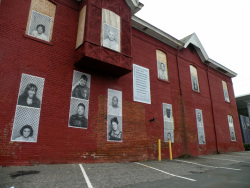Memory in the Shape of a Swimming Lesson

Treloar House (9/13 - 2/14)
by Jon Pineda
If anything, it is like water.
Taking the shape of what surrounds it.
A concrete pool. The walls of a throat.
My earliest memory is of my father
standing at the edge, waving to me,
the tops of his hands more brown
from the summer, patting the water
now, & it is only in looking back,
I see he is doing what he thinks is right.
I am the first son, American-born.
*****
It might even be a ritual, a father
taking his five year-old into his arms
while children from other
Navy families run along the deck.
Lifeguards blow whistles, stop them
dead in their tracks.
Lifting him over the water,
the father offers his son up to fear.
*****
The boy understands the word mestizo. It means “half-breed,"
not full Filipino. It is the word they use at parties
& touch his hair. They speak to him in Tagalog. He knows
it is the language his father speaks on the phone, or under his breath
when he is angry. The boy answers his father’s questions in this language,
& some of the older Filipinos, those from an earlier generation, seem pleased.
It will mark his life. Years later, when the father leaves the family,
the boy forgets these words. They become, like the edge of the pool,
something he struggles to reach.
*****
He crouches by the pool. He is saying, “Like this,” & spooling his fingers
together in the water. He is saying, his accent broken & unmistakably foreign,
not to give up. There are only so many words he uses, some in English & some
in Tagalog, & the boy, flailing his arms to stay afloat, understands none of them.
*****
If anything, it is like learning to swim. Thrashing in the deep end,
the boy feels as if the water itself is a hand. He is sinking into its palm.
Though consumed with fear & the chill rising from the bottom,
he can see his father waving him toward the edge. As if he only needs
to make it there, & it will all be over.
from Birthmark, 2003 winner of the Crab Orchard Series in Poetry, published by Southern Illinois University Press
If anything, it is like water.
Taking the shape of what surrounds it.
A concrete pool. The walls of a throat.
My earliest memory is of my father
standing at the edge, waving to me,
the tops of his hands more brown
from the summer, patting the water
now, & it is only in looking back,
I see he is doing what he thinks is right.
I am the first son, American-born.
*****
It might even be a ritual, a father
taking his five year-old into his arms
while children from other
Navy families run along the deck.
Lifeguards blow whistles, stop them
dead in their tracks.
Lifting him over the water,
the father offers his son up to fear.
*****
The boy understands the word mestizo. It means “half-breed,"
not full Filipino. It is the word they use at parties
& touch his hair. They speak to him in Tagalog. He knows
it is the language his father speaks on the phone, or under his breath
when he is angry. The boy answers his father’s questions in this language,
& some of the older Filipinos, those from an earlier generation, seem pleased.
It will mark his life. Years later, when the father leaves the family,
the boy forgets these words. They become, like the edge of the pool,
something he struggles to reach.
*****
He crouches by the pool. He is saying, “Like this,” & spooling his fingers
together in the water. He is saying, his accent broken & unmistakably foreign,
not to give up. There are only so many words he uses, some in English & some
in Tagalog, & the boy, flailing his arms to stay afloat, understands none of them.
*****
If anything, it is like learning to swim. Thrashing in the deep end,
the boy feels as if the water itself is a hand. He is sinking into its palm.
Though consumed with fear & the chill rising from the bottom,
he can see his father waving him toward the edge. As if he only needs
to make it there, & it will all be over.
from Birthmark, 2003 winner of the Crab Orchard Series in Poetry, published by Southern Illinois University Press
